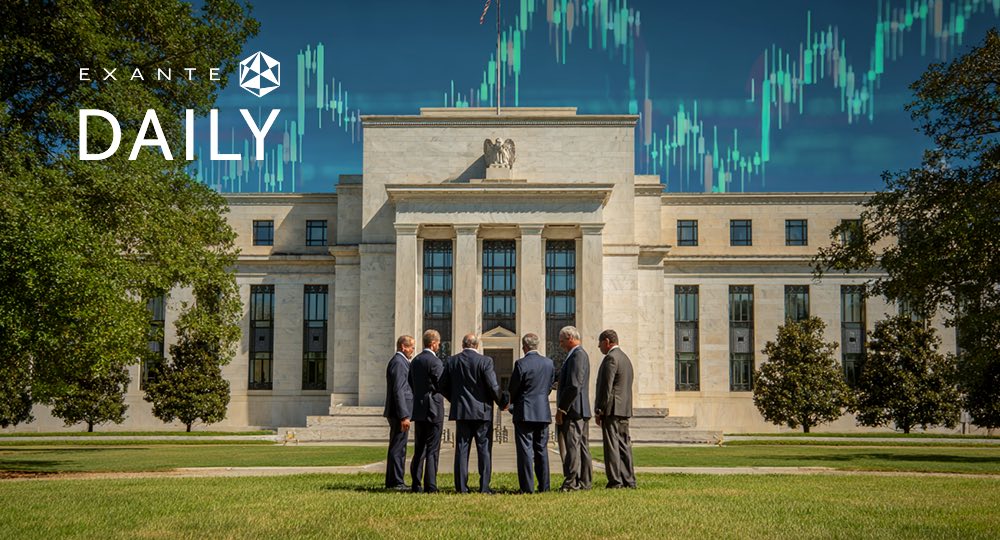- Corporate Earning News
- Global market indices
- Currencies
- Cryptocurrencies
- Fixed Income
- Commodity sector news
- Key data to move markets this week
- Global macro updates
Corporate Earnings News
Nvidia jumped in after hours trading on Wednesday after it forecast second-quarter revenue more than 50% above Wall Street estimates. Adjusted revenue for the quarter ended 30 April was $7.19 billion. It said it is boosting supply to meet surging demand for its artificial-intelligence chips. As noted by Refinitiv, shares of Nvidia have risen by about $200 billion to over $950 billion, making it the world's most valuable chipmaker and Wall Street's fifth-most-valuable company.
And, as companies and investors continue to focus on AI, on Wednesday OpenAI CEO Sam Altman said the ChatGPT maker might consider leaving Europe if it could not comply with the upcoming European Union AI regulations.
Corporate earning calendar 25 May - 1 June 2023
Thursday: Medtronic, Costco, Autodesk, Dollar Tree, Best Buy Inc., Burlington Stores
Friday: Booz Allen Hamilton
Tuesday: Hewlett Packard Enterprise, HP
Wednesday: CrowdStrike Holdings, Salesforce
Thursday: Asana, Broadcom, ChargePoint Holdings, MongoDB, Zscaler
US Stock Indices
Nasdaq 100 +2.70% MTD and +24.35% YTD
Dow Jones Industrial Average -3.06% MTD and-0.28% YTD
NYSE -3.36% MTD and-1.06% YTD
S&P 500 -0.57% MTD and+7.97% YTD
Mega caps had a mixed week as investors worried about the economic impact a debt default could have on demand and yields rose. Apple, Alphabet, AmazonMicrosoft, and Nvidia were down, while Meta Platforms and Tesla are up.
Facebook owner Meta Platforms cut jobs across its business and operations units on Wednesday as it finished the last of a three-part round of layoffs, part of a plan announced in March to eliminate 10,000 roles. According to Reuters, employees working in marketing, site security, enterprise engineering, program management, content strategy and corporate communications took to LinkedIn to announce that they were laid off. The latest cuts were likely to impact around 490 employees at the international headquarters in Dublin, or almost 20% of the Irish workforce.
Microsoft filed an appeal with the Competition Appeal Tribunal on Wednesday of the UK’s decision to block its $69 billion takeover of "Call of Duty" maker Activision Blizzard. The Competition and Markets Authority (CMA) vetoed the deal in April saying it could hurt competition in the cloud gaming market. The EU's competition authorities approved the deal in May. Microsoft has also appealed the US Federal Trade Commission's action seeking to block the deal on the grounds that, the agency said, it would suppress competition.
Energy stocks had a mostly positive week as OPEC+ suggested it could again cut production at its 4 June in an effort to support prices with Energy Fuels, ConocoPhillips, Marathon Petroleum, Phillips 66, Marathon Oil, Occidental Petroleum, Chevron and Apa Corp (US) all up while Shell remained relatively flat.
Materials and Mining stocks were mixed again this week as copper prices hit their lowest level since 29 November due to subdued Chinese demand and growing worries over global economic growth. Iron ore futures also dropped on signs of disappointing steel demand from the construction sector. Albemarle Corporation and Yara International, are up, while Mosaic, CF Industries Holdings, Nucor Corporation, Newmont Mining, Sibanye Stillwater, Celanese Corporation, Freeport-McMoran, and Packaging Corporation of America are down.
European Stock Indices
Stoxx 600 -1.93% MTD and +7.71% YTD
DAX -0.50% MTD and +13.78% YTD
CAC 40 -3.18% MTD and+12.04% YTD
IBEX 35 -0.84% MTD and +11.35% YTD
FTSE MIB -2.04% MTD and+11.89% YTD
FTSE 100 -3.09% MTD and+2.35% YTD
European markets have fallen to a 1.5 month low as continuing high UK core inflation and more losses in European luxury names hurt risk sentiment.
Other Global Stock Indices
MSCI World Index -0.58%MTD and+7.56% YTD
Hang Seng-3.91% MTD and-3.36% YTD
Currencies
The USD strengthened against major currencies amid high Treasury yields as investors sold US government bonds. The UK is now expected to achieve 0.4% growth in 2023, a vast improvement from prior IMF forecasts of -0.3%. Inflation coming in at a higher than expected 8.7% in April likely means continuing BoE rate rises which, in principle, could lead to a higher Pound. The GBP is +2.18%YTD against the USD and at 6 months highs against the Euro. Although debt ceiling negotiations remain fraught in the US, the USD, as a safe haven currency, is likely to continue to strengthen due to the fact that it is held globally and it remains the key currency for global trade despite the dollar share of central banks' foreign reserves in the final quarter of 2022 hitting a two-decade low. The EUR is +0.44%YTD against the USD and slower growth in the Eurozone may result in further softening against the USD.
Cryptocurrencies
Bitcoin -10.06% MTD and +59.26% YTD
Ethereum -4.85% MTD and+50.63% YTD
Florida Governor Ron De Santis, now running for the Republican nomination for President in 2024, said that citizens have “every right to do Bitcoin,” and would oppose any statute to ban its use. This comes after, according to Cryptopotato.com, at Bitcoin Miami 2023, Democratic Presidential candidate Robert F. Kennedy pledged to protect citizens’ “inviolable right” to hold and use Bitcoin. Miami Mayor Francis Suarez is himself a Bitcoin believer, believing it provides advantages over the fiat currency system.
Fixed Income
US 10-year yield to 3.73%.
German 10-year yield to 2.47%.
UK 10-year yield to 4.21%.
The US debt ceiling saga continued to hit bond markets this week with short dated US treasury yields rising to junk bond levels on Wednesday as the yield on some bills due for repayment on 1 June, the “X” day for the US Treasury running out of money, surged to well over 7%. Eurozone bond yields rose after UK inflation data came in stronger than expected on Wednesday but later slipped as German business sentiment weakened. British bond markets are expected to continue to underperform as yields continue to rise over concerns that the central bank is mishandling policy.
Commodities
Gold futures to $1,979.40 an ounce.
Silver futures to $23.06 per ounce.
West Texas Intermediate crude to $74.34 a barrel.
Brent crude to $78.36 a barrel.
US crude oil and distillate inventories fell last week as imports declined according to the Energy Information Administration. Crude inventories fell by 12.5 million barrels in the week to 19 May. OPEC+ warned this week that speculators should “watch out”, a sign that OPEC+ may continue to cut production again. “I keep advising them (speculators) that they will be ouching, they did ouch in April, I don’t have to show my cards, I am not a poker player… but I would just tell them watch out,” Energy Minister Prince Abdulaziz bin Salman is reported to have said at a conference on 23 May.
Gold was relatively flat this week as the US dollar advanced to a more than two-month high and higher yields continued to limit theupside. Investors remain focused on any resolution in debt ceiling negotiations and will also be looking out for US GDP data to determine just how resilient the US economy may be in the face of a potential default.
Note: As of 5 pm EDT 24 May 2023
Key data to move markets this week
EUROPE
Thursday: German GfK Consumer Confidence, German GDP, a speech by Deutsche Bundesbank President Joachim Nagel, and a speech by ECB Vice President Luis De Guindos.
Tuesday: Eurozone Business Climate and Consumer Confidence surveys.
Wednesday: German Unemployment, German Harmonized Index of Consumer Prices, and Eurozone Financial Stability Review.
Thursday: German Retail Sales, German, Spanish and Italian HCOB Manufacturing PMIs, Eurozone HCOB Manufacturing PMI, Eurozone Core Harmonized Index of Consumer Prices, Eurozone Harmonized Index of Consumer Prices, Eurozone Unemployment Rate, and ECB Monetary Policy Meeting Accounts.
UK
Thursday: A speech by Bank of England Monetary Policy Committee member Jonathan Haskel.
Friday: Retail sales.
Monday: Markets are closed for the Bank Holiday.
Thursday: S&P Global/CIPS Manufacturing PMI.
US
Thursday: GDP, Chicago Fed National Activity Index, Initial and Continuing Jobless Claims, Core Personal Consumption Expenditures, Personal Consumption Expenditures Prices, and Pending Home Sales.
Friday: Core Personal Consumption Expenditures Price Index, Durable Goods Orders, Nondefense Capital Goods Orders, Personal Consumption Expenditures Price Index, Personal Income, Personal Spending, Michigan Consumer Sentiment Index, UoM 5-year Consumer Inflation Expectations.
Monday: Markets are closed for Memorial Day.
Tuesday: Housing Price Index, S&P/Case-Shiller Home Price Index, and Consumer Confidence.
Wednesday: Chicago Purchasing Managers’ Index, JOLTS Job Openings, and Fed’s Beige Book.
Thursday: ADP Employment Change, Nonfarm Productivity, Initial jobless claims, Continuing jobless claims, Unit Labour Costs, S&P Global Manufacturing PMI, ISM Manufacturing Employment Index, ISM Manufacturing New Orders, ISM Manufacturing PMI, and ISM Manufacturing Prices Paid.
Global Macro Updates
Divisive debt dynamics. Despite Republican Speaker of the House Kevin McCarthy stating that he thinks there is still time to make a deal, Fitch Ratings placed the United States’ AAA credit rating on negative watch. The US received a creditdowngrade in 2011 following prolonged and turbulent debt ceiling negotiations and it was placed on negative watch in 2013. "The brinkmanship over the debt ceiling, failure of the US authorities to meaningfully tackle medium-term fiscal challenges... and a growing debt burden signaldownside risks to US creditworthiness," Fitch said in its statement on Wednesday. With a week to go until the US may default, the White House and congressional Republicans are expected to resume negotiations today.
To pause or not to pause? According to FOMC notes released on Wednesday, during the May meeting, Fed policymakers were uncertain about how much additional policy tightening might be needed due to slower-than-expected progress on inflation and resilient labour markets and the growing likelihood of tighter credit availability due to continuing banking sector volatility. Fed officials, including Board of Governors member Christoper Wallace, St. Louis Federal Reserve Bank President James Bullard, and Minneapolis Fed President Neel Kashkari, have suggested that tightening will continue to be needed to reduce inflation even if there is a temporary pause in June. It is clear that the Fed will remain data dependent and that it may also be influenced by progress in the debt ceiling negotiations as a default could send the economy into a recessionary tailspin.
The BoE’s model problem. UK inflation came in at 8.7% in April, above the Bank of England’s (BoE) forecast of 8.4%. Although a significant drop from March’s headline inflation of 10.1%, the stickiness indicates that the BoE will need to continue to raise rates, especially as core inflation jumped from 6.2% in March to 6.8% in April. According to the Financial Times, swaps markets are pricing in three or possibly four more interest rate rises to a peak of 5.4% by December, a sharp increase from an expected peak of 4.8% at the end of last week. This came after BoE Governor Andrew Bailey admitted to the House of Commons Treasury Select Committee that the BoE had “very big lessons to learn” in setting monetary policy after the central bank failed to forecast the rise and persistence of inflation and that the bank’s own forecasting model was not delivering accurate results and the committee had reduced its role when setting interest rates. He said, “The reason we are not following the model is because there are asymmetric effects… We have taken a conscious decision to aim off [the model].” He said inflation was likely to fall more gradually to the 2% target than the model had predicted and that instead of using the model’s results, the BoE now had to think about “how we operate monetary policy in the face of very big shocks.” The BoE has stressed most of the inflation has come from sharp rises in the price of gas and food, which the UK imports and the central bank has no control over. However, rising rents and other domestic costs, including wages, indicate that the central bank does have some control and that it will need to continue to take action.
Europe’s growth engine sputtering. Germany officially entered recession with GDP falling by 0.3% in Q1. This follows a decline of 0.5% in the fourth quarter of 2022. Year-on-year, GDP fell by 0.5% when adjusted for price and calendar effects. High inflation is continuing to hit household final consumption expenditure, which was down 1.2% in the first quarter of 2023. The recession in Germany signifies weakness and possible stagnation in the wider Eurozone economy despite a tight labour market. The Eurozone is experiencing rising wages that feed strong underlying pressures, according to the Bundesbank. The highly anticipated continuation of rate hikes by the ECB will likely continue to dampen demand as credit becomes more expensive, providing a stronger drag on growth.
Election surprises? Spain goes to the polls on 28 May in local and regional elections and come just six months before Spain must vote for a new national government. According to Euronews, polls show neither of the two largest parties are expected to win enough seats to form a majority government.
Instead, they will need to rely on the support of smaller parties, including separatist and far-right parties, to gain power. The results of May’s regional votes will offer the clearest idea yet as to whether Spain’s minority socialist government will survive, or whether the conservative People’s Party (PP) will form a government with far-right VOX. It will also, according to Politico, show if Podemos, the political party founded in 2015, can survive. As the junior partner of Prime Minister Pedro Sánchez’s Socialist Workers’ Party (PSOE) in a coalition government, it has suffered an electoral decline that threatens to become a full-blown crisis.
Another key election is the run-off on 28 May in Turkey between President Recep Tayyip Erdoğan and opposition leader Kemal Kılıçdaroğlu. As noted by Carnegie Europe, whoever wins will continue to govern under the revised 2017 constitution which means that, if Erdoğan is re-elected, he will be able to become even more authoritarian and nationalistic. Sinan Oğan, the nationalist “kingmaker” who came third in Turkey’s first round of the presidential election, is throwing his weight behind President Recep Tayyip Erdoğan.
Crypto’s new global rules. The International Organization of Securities Commissions (Iosco), an umbrella group of regulators from 130 jurisdictions, revealed its first global approach to regulating crypto asset and digital markets. As noted by The Guardian, Iosco said its members, which include the UK’s Financial Conduct Authority (FCA) and the Securities and Exchange Commission in the US, should be protecting investors and ensuring “market integrity” in ways that “are the same as, or consistent with, those that are required in traditional financial markets”.
The proposed standards cover conflicts of interest, market manipulation, cross-border regulatory cooperation, custody of crypto assets, operational risks, and treatment of retail customers. This includes requiring trading platforms to publicly disclose how they vet crypto assets before allowing them to be traded, clearly explain how they store and safeguard clients’ crypto assets, and ensure they are separated from the firm’s own assets that might be used for proprietary trading. Iosco chairperson Jean-Paul Servais said, according to Reuters, that the plans represent a turning point in tackling risks from crypto assets such as bitcoin and ether.
DISCLAIMER: While every effort has been made to verify the accuracy of this information, EXT Ltd. (hereafter known as “EXANTE”) cannot accept any responsibility or liability for reliance by any person on this publication or any of the information, opinions, or conclusions contained in this publication. The findings and views expressed in this publication do not necessarily reflect the views of EXANTE. Any action taken upon the information contained in this publication is strictly at your own risk. EXANTE will not be liable for any loss or damage in connection with this publication.
Este artigo é-lhe fornecido apenas para fins informativos e não deve ser considerado como uma oferta ou solicitação de uma proposta para compra ou venda de quaisquer investimentos ou serviços relacionados que possam ser aqui referenciados. A negociação de instrumentos financeiros envolve um risco significativo de perda e pode não ser adequada para todos os investidores. O desempenho passado não é um indicador fiável do desempenho futuro.






